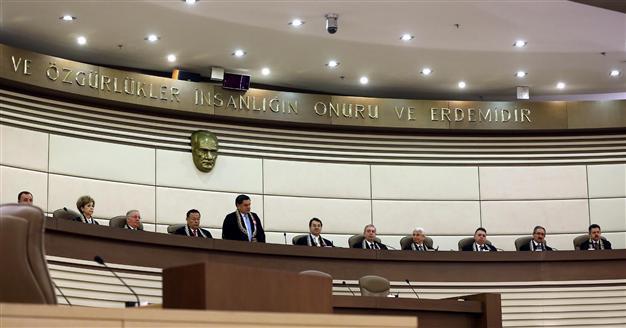Top court rejects appeal for lifting May Day ban at Taksim Square
ANKARA

The Constitutional Court has recently issued rulings that had sparked vivid reactions from the government. DHA Photo
Turkey’s top court has rejected an individual appeal to overturn the government’s ban on celebrating May Day at Istanbul’s iconic Taksim Square.The appeal was filed to the Constitutional Court on April 24 by lawyer Sedat Vural of the Ankara Bar Association, arguing, “Refraining from violating the freedom of assembly and expression is an obligation.”
In its ruling published in the April 30 edition of the Official Gazette, the court rejected the appeal on the grounds that “appeal mechanisms had not been exhausted,” saying the appeal is “inadmissible” and was made with unanimity.
In his appeal, Vural cited Article 34 of the Constitution, which covers the right to hold meetings and demonstration marches.
“Everyone has the right to hold unarmed and peaceful meetings and demonstration marches without prior permission. The right to hold meetings and demonstration marches shall be restricted only by law on the grounds of national security, public order, prevention of committing of crime, protection of public health and public morals or the rights and freedoms of others. The formalities, conditions, and procedures to be applied in the exercise of the right to hold meetings and demonstration marches shall be prescribed by law,” reads Article 34.
Nonetheless, weeks before May Day, several governmental officials, including Prime Minister Recep Tayyip Erdoğan, had already declared their objection to using Taksim Square for this year’s May Day demonstrations.
The court, which has recently issued rulings that had sparked vivid reactions from the government, sparking a row between its president, Haşim Kılıç, and Prime Minister Recep Tayyip Erdoğan.
The latter had criticized the court’s ruling to unblock Twitter for being made without exhausting all legal paths.
Kılıç replied that some cases could be exceptionally reviewed with urgency considering their “importance and sensitivity.”
Taksim Square has a symbolic meaning for Turkey’s labor movement. On May 1, 1977, also known as the “Labor Day Massacre,” 34 people were killed in clashes, after which the square was not allowed to be used as a place for Labor Day demonstrations.
However, the government declared May 1 an official holiday in 2009; and in 2010, for the first time in 32 years, thousands of people marched to Taksim Square and demonstrated. No major incidents occurred during the demonstrations in 2010, 2011 and 2012.
But this was not the case in 2013, when access to Taksim Square was blocked by the authorities, citing ongoing construction at the site, which officials said might be dangerous for demonstrators. The square was scene of violence, as police attacked protesters in a prequel to the wave of nationwide anti-government Gezi Park demonstrations last June.
















